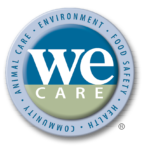Animal Care
Bio-security
Eichelberger Farms utilizes strict bio-security protocols to help prevent diseases on our farms, allowing us to ensure the well-being of our animals. 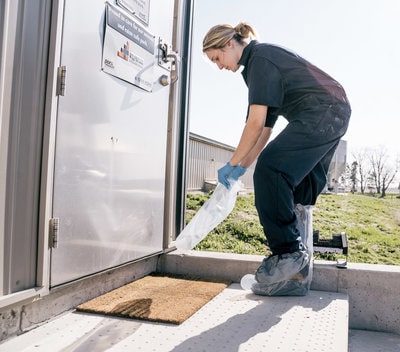 All people entering our sow farms are required to shower in, meaning the only way to enter the farm is to travel through one of the private shower stalls and then wear the “clean” clothing provided by the farm on the inside. This is to prevent people from unknowingly carrying pathogens into the farm on their clothing or bodies. They leave the farm the same way, returning to their own “dirty” clothes. We also ensure that all supplies that enter our farms are clean by passing them through a disinfectant and drying room or via ultraviolet lights.
All people entering our sow farms are required to shower in, meaning the only way to enter the farm is to travel through one of the private shower stalls and then wear the “clean” clothing provided by the farm on the inside. This is to prevent people from unknowingly carrying pathogens into the farm on their clothing or bodies. They leave the farm the same way, returning to their own “dirty” clothes. We also ensure that all supplies that enter our farms are clean by passing them through a disinfectant and drying room or via ultraviolet lights.
To ensure diseases are not spread during the transportation of animals, every trailer that moves animals from and to our sow farms is cleaned and “baked” using a thermal assisted drying and disinfectant system.
Antibiotic use
At Eichelberger Farms, we believe that the conscientious use of antibiotics is a crucial part of animal well-being, as well as our responsibility to our community and to our consumers. All antibiotic use requires approval by a veterinarian, and is continually evaluated to ensure it is necessary to improve the health of the pigs. We exceed the FDA required withdrawal periods to ensure no antibiotics remain in the pigs when they are harvested.
Housing
All of the housing provided for our animals is designed to provide high levels of care for the animals by making sure they all have proper access to feed and water, as well as providing a climate controlled environment that ensures proper temperature year-round. The style of housing for the pigs varies according to their stage of growth.
Gestation (Pregnancy)
There has been lots of discussion comparing group housing versus individual maternity pens. For the sows that are gestating, we currently use both methods of housing our animals, and are continually evaluating the merits of each system. The individual maternity pens ensure the sow has proper access to feed and water at all times, and protects her from the aggression of other animals. The group housing systems allows the sows to freely roam, but the sows will often fight with each other to establish dominance, often resulting in increased lameness and injury. It also makes it more difficult for the caregiver to monitor the health and well-being of individual animals when they are penned in large groups.
Farrowing (birth and first 21-24 days of age)
For the sows, or mother pigs, we place them in individual farrowing crates while they are giving birth and nursing their piglets. This is necessary for the safety of the piglets in order to prevent the mother from accidentally laying on her piglets.
Wean to Finish
All of our pigs that are in the growth stage for market are housed in large pens.
Welfare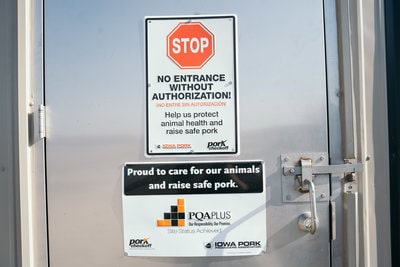
At Eichelberger Farms, we believe that producing high quality pork requires high standards of animal care, housing, and respect for our livestock. We maintain high welfare standards by adhering to a strict policy for mistreatment, abuse, or neglect of animals. All contract growers and animal care givers are required to be Pork Quality Assurance Plus™ certified. Internal Common Swine Industry Audits are performed on all animal sow premises quarterly and wean to finish premises bi-annually. In addition, a third party company randomly selects 10-20% of our premises for PAACO™ certified third party audits annually. To ensure safe handling and transportation of our animals we require all live haul transporters to be Transport Quality Assurance™ certified.
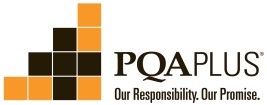
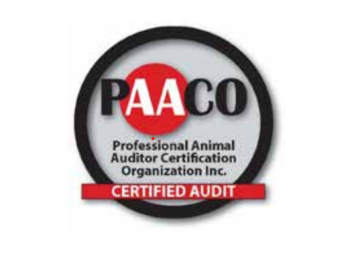

We Care
Eichelberger Farms actively participates in the Pork Checkoff’s WE CARE initiative, embracing our responsibility to:
- Protect and promote animal well-being
- Ensure practices to protect public health
- Safeguard natural resources in all of our practices
- Provide a work environment that is safe and consistent with our other ethical principles
- Contribute to a better quality of life in our communities
All members of our team have a responsibility to do his or her part to demonstrate a commitment to the responsible and ethical treatment of the animals in our care.
Click here to learn more about the WE CARE initiative.
